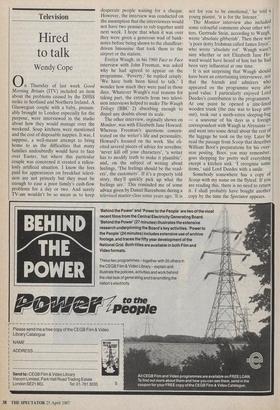Television
Hired to talk
Wendy Cope on Thursday of last week Good Morning Britain (ITV) included an item about the problems caused by the DHSS strike in Scotland and Northern Ireland. A Glaswegian couple with a baby, presum- ably brought to London especially for the purpose, were interviewed in the studio about how they would manage over the weekend. Soup kitchens were mentioned and the cost of disposable nappies. It was, I suppose, a well-meant attempt to bring home to us the difficulties that many families undoubtedly would have to face over Easter, but where this particular couple was concerned it created a ridicu- losly artificial situation. I know the fees paid for appearances on breakfast televi- sion are not princely but they must be enough to ease a poor family's cash-flow problems for a day or two. And surely TV-am wouldn't be so mean as to keep desperate people waiting for a cheque. However, the interview was conducted on the assumption that the interviewees would not have two pennies to rub together until next week. I hope that when it was over they were given a generous wad of bank- notes before being shown to the chauffeur- driven limousine that took them to the airport or the station.
Evelyn Waugh, in his 1960 Face to Face interview with John Freeman, was asked why he had agreed to appear on the programme. 'Poverty,' he replied crisply. `We have both been hired to talk.' I wonder how much they were paid in those days. Whatever Waugh's real reasons for taking part, the extracts from two televi- sion interviews helped to make The Waugh Trilogy (BBC 2) absorbing enough to dispel any doubts about its scale.
The other interview, orginally shown on Monitor, was with Elizabeth Jane Howard. Whereas Freeman's questions concen- trated on the writer's life and personality, Howard's focused on the work. She eli- cited several pieces of advice for novelists: `never kill off your characters', 'a writer has to modify truth to make it plausible', and, on the subject of writing about feelings, 'The feelings should be the read- ers', the customers'. If it's a properly told story, they'll quickly pick up what the feelings are.' This reminded me of some advice given by Daniel Barenboim during a televised master-class some years ago. 'It is not for you to be emotional,' he told a young pianist, 'it is for the listener.' The Monitor interview also included some colourful comments about other wri- ters. Gertrude Stein, according to Waugh, wrote 'absolute gibberish'. Then there was 'a poor dotty Irishman called James Joyce', who wrote 'absolute rot'. Waugh wasn't sure whether or not Elizabeth Jane Ho- ward would have heard of him but he had been very influential at one time. It is not surprising that Waugh should have been an entertaining interviewee, nor that the friends and admirers who appeared on the programme were also good value. I particularly enjoyed Lord Deedes's contribution to the programmes. At one point he opened a zinc-lined wooden trunk (the zinc was to keep ants out), took out a moth-eaten sleeping-bag — a souvenir of his days as a foreign correspondent with Waugh in Abyssinia and went into some detail about the rest of the luggage he took on the trip. Later he read the passage from Scoop that describes William Boot's preparations for his over- seas posting. Boot, you may remember, goes shopping for pretty well everything except a kitchen sink. 'I recognise some items,' said Lord Deedes with a smile.
Somebody somewhere has a copy of Scoop with my name on the flyleaf. If you are reading this, there is no need to return it. I shall probably have bought another copy by the time the Spectator appears.


































































 Previous page
Previous page